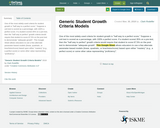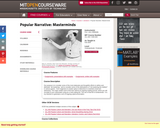
One of the most widely-used criteria for student growth is "half way to a perfect score." Suppose a unit test is scored as a percentage, with 100% a perfect score. If a student scored 35% on a pre-test, then the "half way to perfect" growth criteria would require that student to score 67.5% on the post test to demonstrate "adequate growth." While popular and easy to implement, there are some end-case problems with this criteria. For example, a student who scores 94% on a pre-test would need to score 97% or higher on the post-test to show adequate growth. This might be a very difficult goal to reach. On the other end, a student receiving a 10% on a pre-test would only need to score 55% or higher on the post-test. While much more likely than the first example, this could result in students with "failing" post-test scores showing "adequate growth" for that unit. This Google Sheet allows educators to experiment with a few alternate parameter-based models (linear, quadratic, or brachistochrone) based upon either "mastery" (e.g., a perfect score) or some other value representing "proficiency" (e.g., 80%), as well as setting minimum adequate post-test scores.
- Subject:
- Education
- Material Type:
- Case Study
- Interactive
- Date Added:
- 11/30/2018
